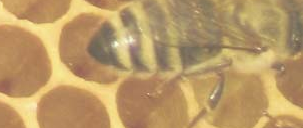
Summary: In Arkansas, a small beekeeper may legally sell their honey with reduced requirements, typically under or similar to, Cottage Food Laws or Home Food Processor requirements. Arkansas beekeepers may sell honey products directly from the apiary to consumers. Beekeepers may NOT see them wholesale without a valid permit from the Arkansas Department of Health. Honey is treated as a farm product, and is therefore exempt from sale tax when sold direct-from-apiary, which may also include an suburban or urban beekeeper's home.
Regulations
Honey, like other food products sold in their Natural State is regulated by the Arkansas Department of Health.
- Quantity: Beekeepers who produce less than 500 gallons of honey per year for sale are not required to be inspected by the Arkansas Department of Health.
- Inspections: Inspections are not required, but if a hobbyist requests to be inspected, the Arkansas EHS will provide the proper plan review guidelines. After the permit process, the hobbyists are treated as any other food service establishment, and may be subject to ADH food processing rules and regulations and practices.
- The Cottage Food Operations Act (Act 72 of 2011)
allows the following foods to be prepared for sale in the home kitchen without a permit.
bakery items that do not require refrigeration, fruit butters, candy, jellies, jams, honey, sorghum, maple syrup, and raw fruits and vegetables. (Upon request, samples of products shall be made available to the Arkansas Department of Health.) - Labeling: there are legal requirements for labeling (see the next section for details)
Labeling your honey
- A label must indicate the common name (Honey) clearly visible on the label.
- Monofloral honey varieties may be labeled with the floral name, such as "Blueberry honey", "Clover Honey" or "Blackberry Honey" if you are certain that this is correct and true.
- Labels must list the contact information (name and address) for the packer (i.e., typically, the beekeeper) in a type size that is at least 1/16" tall.. If you purchase honey from another beekeeper and bottle it yourself, your contact information must appear on the label. Optional information includes: phone number, email address and/or website.
- .The net weight of the honey, excluding package weight, must be presented in easy-to-read type, located on the lower third of the label.
- The net weight must be presented in both pounds and ounces, and in metric weight (i.e. "Net Wt. 16 oz. (454 g)"). FYI, 1 oz. = 28.3495 grams.
- If the container holds a known volume of fluid ounces you may use this to calculate the net weight. For example,a pint jar holds 16 fluid ounces, which is 1.5 pounds of honey.
- If you are using a container of unknown volume, measure the volume of water it holds, and use an online honey calculator to establish its net weight.
References:
- The Cottage Food Operations Act (Act 72 of 2011) allows a limited selection of foods to be prepared for sale in the home kitchen without a permit. The foods that are allowed under this act pose low risk of illness caused by hazardous bacteria. These include bakery items that do not require refrigeration, fruit butters, candy, jellies, jams, honey, sorghum, maple syrup, and raw fruits and vegetables. (Upon request, samples of products shall be made available to the Arkansas Department of Health.) Prepared foods that require temperature control for safety or to limit microorganism growth or toxin formation are not allowed for sale under this act. Product must be labeled with the name and address of the business, and must contain a list of ingredients. The label should include the statement "This Product is Home-Produced" in 10-point type.
- Beekeepers making honey in its Natural State may apply for the Arkansas Grown
branding program,
Resources
Great helpful books and guides
The Backyard Beekeeper - Absolute Beginner's Guide to Keeping Bees in Your Yard and Garden, Setting up and caring for your own colonies,practical and nontoxic ways to care for your bees, Swarm control
The Backyard Beekeeper's Honey Handbook: A Guide to Creating, Harvesting, and Cooking with Natural Honeys
Beekeeping For Dummies, very popular
The Backyard Beekeeper’s Honey Handbook by Kim Flottum
- National Honey Board
- National and International Beekeeping Associations
- State and Local Beekeeping Associations
- Honey, Beekeeping & Processing Supplies:
- Magazines: Bee Culture and American Bee Journal
Other states
- Alabama
- Arizona
- California
- Colorado
- Florida
- Iowa
- Kansas
- Kentucky
- Minnesota
- Missouri
- New Hampshire
- North Dakota
- South Dakota
- Tennessee
- Texas
- Utah
- Virginia
- Wisconsin